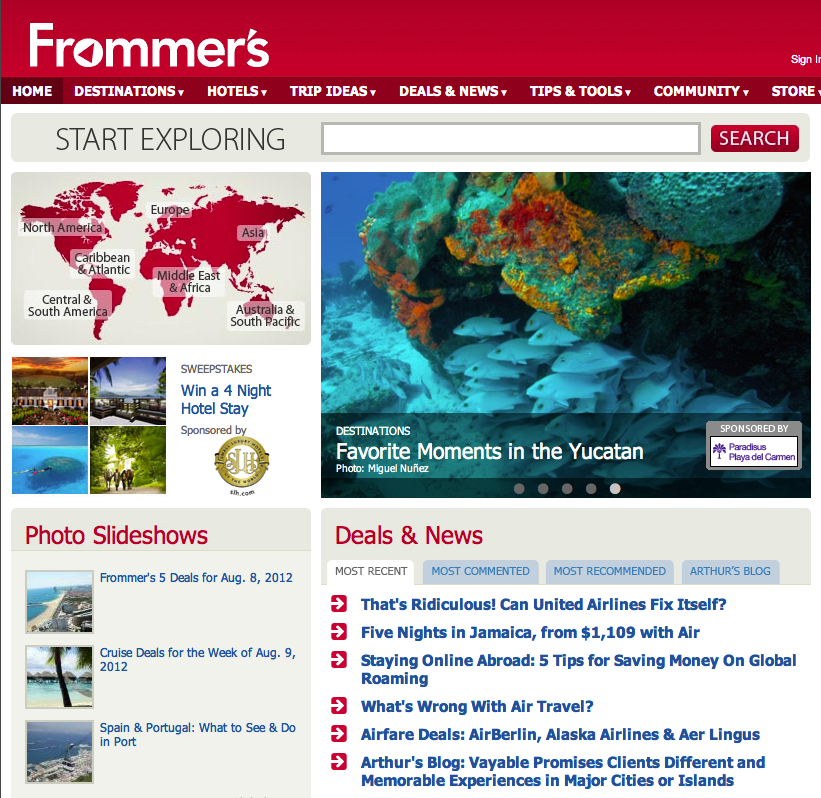Google Buys Frommer’s: Blending Strategies and Business Model Competition in the Online Information and Review Industry
 According to a press release, publishing giant John Wiley & Sons has decided to sell its popular travel information brand, Frommer’s, to Google. This move seemingly complements Google’s recent purchase of Zagat, the popular restaurant rating company (they also rate hotels, nightlife spots, and tourist destinations).
According to a press release, publishing giant John Wiley & Sons has decided to sell its popular travel information brand, Frommer’s, to Google. This move seemingly complements Google’s recent purchase of Zagat, the popular restaurant rating company (they also rate hotels, nightlife spots, and tourist destinations).
Both Frommer’s and Zagat (founded in 1957 and 1979, respectively) were famous for their guidebooks. Similarly, both had failed to fully embrace the emergence of the Internet and the corresponding user-generated content (UGC) trend. Much like Wikipedia displaced the pre-Internet juggernauts of the encyclopedia business (Britannica stopped publishing print editions this year), these iconic information companies saw themselves being pushed from the top of their traditional industry by user-generated competitors like Yelp and TripAdvisor (and to some extent Lonely Planet—which more quickly switched to an Internet-centric business model—and Wikitravel).
In many ways, the Google/Zagat and the Google/Frommer’s mergers may be matches made in heaven. With Google scrambling to compete with the likes of Yelp and TripAdvisor, the company obviously saw adding the professional “expert” content of Frommer’s and Zagat to its UGC as a way of differentiating itself among its competitors. And it is not just historical content either. Google has, at least initially, committed to keeping—and expanding—the professional staff of both Frommer’s and Zagat.
Google’s recent foray into “professional” content will likely revive the now trite “expert” vs. “amateur” content debate (see: the lament of the dying newspaper industry). And I’m sure people will make the “pendulum is swinging” back from amateur content toward expert content argument (get ready for the Google abandoning UGC storyline). However, the takeaway is not black and white. Both UGC and expert commentary can complement each other to make a better product.
As an example, see what Google is currently doing with Zagat. Take my favorite local restaurant Ray’s The Steaks. Google offers the Zagat Review, that is complemented with a series of user ratings and content (and notice, it is using this to drive more traffic to its Google+ page… so, this might actually be a macro attempt to compete with Facebook). Compare this with the same restaurant’s Yelp review, which has a much more appealing UGC interface with a much higher number of user reviews (with a robust online community to boot). However, with Google’s recent purchases, I wouldn’t be surprised if Yelp figured out a way to include its own version of “expert” reviews and commentary to supplement its current user driven experience.
As an article in Wharton Business School’s online journal, Knowledge@Wharton pointed out a few years ago:
The mergers between traditional media companies and user-generated sites are indications of where Internet content is headed, say experts at Wharton. Despite hand wringing over professional and amateur content, the reality is that consumers will use and appreciate both.
“Pitting amateur and professional content against each other makes a good storyline, but it’s misleading to see them as fundamentally opposed,” says [Kevin] Werbach. “User-generated content will never match The New York Times for the overall quality of coverage of the Iraq war, for example, but reading Iraqi blogs, or political blogs about the war, provides some perspectives you won’t get from any newspaper.” And, he adds, “There’s no way a traditional encyclopedia will ever match the coverage of Wikipedia, because there are so many more contributors. On the other hand, while the quality of most Wikipedia entries is surprisingly good, there are times you want the certainty of a reference work that is professionally edited and vetted, or a smaller set of resources that have been pre-selected by experts.”
[Kendall] Whitehouse agrees, and sees a hybrid approach emerging that embraces both professional and amateur content. Professional content on the web often has a user-generated component to it, whether it’s a complementary blog or a user discussion forum. “The big challenge is the economic problem. What funded the traditional content model is falling apart,” says Whitehouse. “Ideally, I see Internet content being a blend of professional and amateur content, but how do we develop an economic model that supports both?”
Offering both “expert” and “amateur” content—and finding the right way to blend the two—is a logical direction for the online content industry to move in. Just because the Internet empowers user-generated content does not mean that “expert” commentary is dead; it’s just not the only game in town. (Take popular movie review site Metacritic that compares “professional” critic reviews with amateur “user” reviews.) Perhaps providing an “expert” set of baseline reviews that are complemented by an engaged online community that provides further feedback, criticism and details is the wave of the future. Perhaps, not. Either way, users can sort out which approach they like best.








